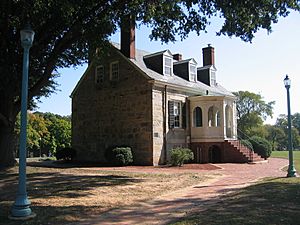Forest Hill Park (Richmond, Virginia) facts for kids
Quick facts for kids Forest Hill Park |
|
|---|---|

Holden Rhodes house in Forest Hill Park
|
|
| Type | Public park |
| Location | Forest Hill Avenue, Richmond, Virginia, U.S. |
| Area | 105 acres (42 ha) |
| Created | c. 1933 |
| Open | Year-round |
| Lua error in Module:Location_map at line 420: attempt to index field 'wikibase' (a nil value). | |
| Area | 105.2 acres (42.6 ha) |
| Built | 1843 |
| Architect | Gilbert, Ernest R. |
| Architectural style | Greek Revival, Bungalow/craftsman |
| NRHP reference No. | 02001446 |
| Significant dates | |
| Added to NRHP | November 22, 2002 |
Forest Hill Park is a popular and historic park in Richmond, Virginia. It covers about 105 acres (0.42 square kilometers). The park is famous for its "Stone House," also known as Boscobel. This park has a long history, starting as private land before becoming a city park.
Contents
A Park with a Past: How Forest Hill Park Began
Forest Hill Park has a rich history. The land was once part of a huge property owned by William Byrd III. He was the son of William Byrd II, who founded the city of Richmond. In 1768, some of his land, about 1730 acres, was sold. This large area between Reedy Creek and Powhite Creek was bought by Bernard Markham.
The Rhodes Family and the Stone House
In 1820, Holden Rhodes came to Manchester, near Richmond. He was a tutor for Judge Samuel Taylor's sons. Rhodes later became a lawyer and a judge. He also helped start the Richmond and Petersburg Railroad in 1836. This railroad is now part of CSX Transportation.
In 1833, Rhodes bought 103 acres of land. He built his country home, "Boscobel," between 1836 and 1843. "Boscobel" means "beautiful woods" in Italian. Today, this house is known as the Old Stone House in Forest Hill Park. It was built with granite likely from the property itself. When Rhodes died in 1857, his nephew, Charles H. Rhodes, Jr., inherited the estate.
During the American Civil War (1860–1865), young Rhodes sold the property. It was sold a few more times before a group of New York investors bought it in 1871.
From Estate to Amusement Park Fun
In 1889, the land was sold again. It became a stop for the Forest Hill trolley. This trolley was part of one of the first successful trolley systems in the United States. The Virginia Passenger and Power Company took over the trolley system in 1925.
To attract more riders, the old Rhodes home was turned into a trolley station. It had a big porch and a bell tower. An exciting amusement park was built on the grounds. It had a carousel, a roller coaster, a fun house, and a dance hall. There was also a swimming area and a boat lake in the old quarry pond. The park was very popular until it closed in 1932. This was due to the tough economic times of the Great Depression.
Forest Hill Park: A City Gem Today
The land was given to the City of Richmond in 1933. The old wooden amusement park rides were taken down. The goal was to turn the area into a beautiful city park. The Rhodes home was fixed up to be a community library and meeting place. The wooded area that once held the quarry pond returned to its natural state.
During the Works Progress Administration (1935–1943), many people found work here. Unemployed craftsmen and stonemasons helped pave the park's footpaths with cobblestones. They also built a stone gazebo and a small warming hut for ice-skaters. New plants were added, including an azalea garden.
Forest Hill Park became a peaceful place for families. People came for picnics, walks, hikes, and bird-watching. In the 1940s, the Forest Hill Garden Club won an award. They planted native Virginia species in a 2-acre area of the park.
Over the years, the park's pond became a wetland. This attracted animals rarely seen in city parks. These included bald eagles, river otters, and great blue herons. In 2009, the City of Richmond restored the lake. They also created a system to prevent future silting. This helps keep the lake healthy for wildlife. Improvements continued in 2010, including new trails and a pedestrian bridge.
In 2002, Forest Hill Park was added to the Virginia and National Registers of Historic Places. It was recognized for its history as a trolley stop and its WPA features. It also played a key role in developing nearby Richmond neighborhoods.
What You Can Do at Forest Hill Park Today
Since 1997, a group called Friends of Forest Hill Park has been helping. They work with the City of Richmond's Department of Parks and Recreation. They also partner with other local groups. Their goal is to make sure Forest Hill Park stays a great place for everyone to enjoy for many years.
Images for kids
 | Sharif Bey |
 | Hale Woodruff |
 | Richmond Barthé |
 | Purvis Young |


